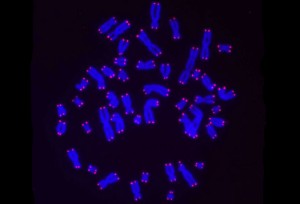 Short telomeres—the end caps on repetitive sequences of DNA—may be a precursor of age-related diabetes, affecting as many as one in four adults older than 60.
Short telomeres—the end caps on repetitive sequences of DNA—may be a precursor of age-related diabetes, affecting as many as one in four adults older than 60.
As telomeres shorten, cells lose the ability to divide normally and eventually they die. Telomere shortening has been linked to cancer, lung disease, and other age-related illnesses.
Research using mice finds diabetes seems to occur more often in patients with dyskeratosis congenita, a rare inherited disease caused by short telomeres. Patients with the disease often have premature hair graying and are prone to develop early organ failure.
“Dyskeratosis congenita is a disease that essentially makes people age prematurely,” says Mary Armanios, assistant professor of oncology at Johns Hopkins University. “We knew that the incidence of diabetes increases with age, so we thought there may be a link between telomeres and diabetes.”
Armanios and colleagues from the Karolinska Institutet in Sweden studied mice with short telomeres and their insulin-producing beta cells. Human diabetics lack sufficient insulin production and have cells resistant to its efficient use, causing disruption to the regulation of sugar levels in the blood.
The research is reported in the journal PLoS One.
Despite the presence of plentiful, healthy-looking beta cells in the short telomere mice, they had higher blood sugar levels and secreted half as much insulin as mice in a control group.
“This mimics early stages of diabetes in humans where cells have trouble secreting insulin in response to sugar stimulus,” Armanios says. “Many of the steps of insulin secretion in these mice, from mitochondrial energy production to calcium signaling, functioned at half their normal levels.”
In beta cells from the mice with short telomeres, disregulation of p16, a gene linked to aging and diabetes was present. No such problems were found in the control group.
In addition, many of the gene pathways essential for insulin secretion in beta cells, including pathways that control calcium signaling, were altered in beta cells from mice with short telomeres.
Some studies have suggested that diabetic patients may have short telomeres, but it was not clear whether this contributes to or is a consequence of the disease.
“Age is the most important risk factor for diabetes, and we also know that family heredity plays a very important role,” Armanios says. “Telomere length is an inherited factor and may make people more prone to develop diabetes.”
The research was funded by the National Institutes of Health, a Ruth L. Kirschstein Award, and the Maryland Stem Cell Research Fund, Sidney Kimmel Foundation, Doris Duke Charitable Foundation, Swedish Research Council and Family Erling-Persson Foundation.
Souce: Johns Hopkins University








